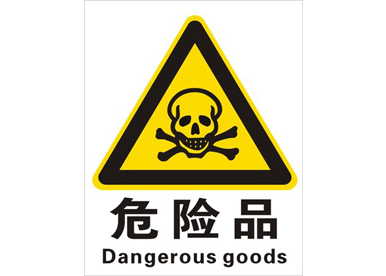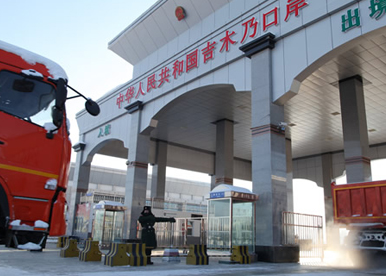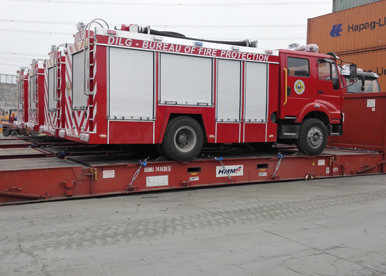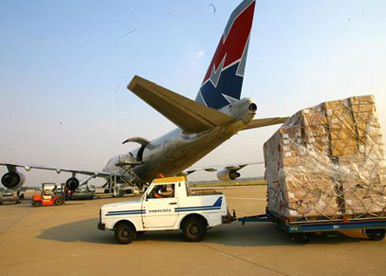General Transportation Terms for Bulk Goods
1、 Liner Terms
Liner Terms, also known as Berth Terms or Gross Terms, refer to the responsibility of the ship owner to hire loading and unloading workers and pay for loading and unloading and stacking fees.
Specifically, at the loading port, the lessee is only responsible for delivering the goods to the dock, alongside the ship, and placing them under the ship's hook. The ship owner receives the goods from within the reach of the ship's hook at the unloading port, the ship owner is responsible for delivering the goods under the ship's hook, and the lessee receives the goods under the ship's hook. As for the division of expenses, it is entirely based on this standard.
In shipping practice, some people mistakenly believe that as long as a liner clause is established in the contract, such transportation should be carried out completely according to the conditions of liner transportation, but in fact, this is not the case. The so-called liner clause only imitates the practice of liner ships in the sharing of loading and unloading costs, that is, the shipowner bears the loading and unloading costs, without involving other rights and obligations.
2、 Unloading without loading (F.I.)
The lessor does not bear the loading cost clause (FREE IN is usually used as FILO, which means FREE IN&LINER OUT, commonly known as "unloading without loading")
The lessor does not bear the loading fee clause (F.I.), also known as the in hold receipt clause. Under this clause, the shipowner is only responsible for receiving the goods in the hold at the loading port, and the loading costs are borne by the lessee, while the costs incurred at the unloading port are borne by the shipowner.
3、 Tube installation without unloading (F.O.)
This clause is also known as the in cabin delivery clause (F.O.). According to this clause, the loading fee shall be paid by the shipowner at the loading port, and at the unloading port, the shipowner shall only be responsible for delivering the goods in the hold, while the unloading fee shall be borne by the lessee.
CSCL ASIA 2. jpg
4、 Regardless of loading or unloading (F.I.O)
The lessor does not bear the loading and unloading fee clause (F.I.O.), also known as the in cabin collection and delivery clause. Under this clause, the shipowner is only responsible for receiving and delivering goods in the hold, and the lessee shall hire loading and unloading workers at both ports and bear the loading and unloading costs.
5、 Regardless of loading and unloading, stowage, and leveling fees clause (F.I.O.S.T.)
The lessor is not responsible for the loading, unloading, stowage, and leveling fees clause (F.I.O.S.T.), also known as the cargo collection, delivery, and responsibility for the stowage fees clause. This clause is completely opposite to the liner clause, and the ship owner is not responsible for all costs related to loading and unloading. All hired loading and unloading workers and related loading and unloading costs are borne by the lessee. Under this clause, the binding fees and required binding materials for the shipment of large goods should also be borne by the lessee. However, in order to avoid unnecessary disputes, when transporting large cargo, the contract should specify the word "Lashed" to indicate that the ship owner is not responsible for the tying fee. Similarly, if the words "Dunnages" are added after the above regulations, it indicates that the lessor is not responsible for the above fees and is not responsible for the dunnage costs.
The key words for chartering and transporting bulk cargo are as follows:
(1) Shipment terms:
A) FO=Free Out, regardless of unloading,
If the price terms we sign with the customer are CFR FO, it indicates that we are not responsible for unloading.
B) LO=Liner Out pipe unloading,
If the price terms we sign with the customer are CFR LO, it indicates that we are responsible for unloading.
C) FIO=Free In&Out, regardless of loading or unloading; The shipowner is not responsible for loading and unloading, and this clause is often used for chartering bulk cargo ships
D) FILO=Free In Liner Out, regardless of loading and unloading, the shipowner is only responsible for unloading and not loading. This clause is commonly used by shipowners when quoting freight forwarders
E) LIFO=Liner In Free Out; The shipowner is only responsible for loading and not unloading, and this clause is rarely used. These clauses are the most basic provisions for the transportation of bulk goods. Of course, if renting a ship, there will also be many costs, such as tying, padding, and so on.
F) FLT=Full Liner Terms=BT=Berth Terms (LT=BT) pipe loading and unloading, also known as full liner terms, where the shipowner is responsible for the loading and unloading costs, is commonly used by freight forwarders when quoting prices to the shipowner
(2) Container terms: A) CY=CY, B) CY=FO (CY=Container yard)
(3) S T=Stowed Trimmed tally, flat cargo
L S D=Lashing, Securing, Dunnaging tying, reinforcement, and padding fees
(4) LayCAN: Load period, which is an important clause of the charter agreement, is the loading and unloading time; CAN=CANCELING, cancel the contract time. For us, it is necessary to prepare for shipment, customs clearance, and other preparations before the first day of LayCAN, otherwise it is easy to incur demurrage fees of tens of thousands of dollars per day.
(5) CQD=Customer Quick Despatch, indicating fast loading and unloading according to port habits; It is a term in the charter business and belongs to the content of the loading and unloading rate clause. Generally, shipowners are unwilling to accept this clause because they have to bear significant risks. For example, in case of port congestion, only the shipowner bears the loss of the shipping schedule. So generally, shipowners insist on having a loading and unloading rate. But if the shipper or charterer is not familiar with the loading or unloading rate, or wants to transfer the risk to the shipowner, then insist on this clause. However, the shipowner will be aware of the loading or unloading situation at this port beforehand and will also consider this factor in the provided quotation. Correspondingly to this term is DETENTION, which means that under CQD terms, if the shipping schedule is affected due to incomplete cargo preparation, claims for losses must be made to the shipper or charterer based on DETENTION.
Unless the shipowner has a good understanding of the loading and unloading port and route, the goods themselves are attractive, and the lessee is reassured, CQD will generally not be accepted.
Steel pipes are generally made under FILO terms. For Southeast Asia and Brazil, FIO terms are generally used, while for the Middle East and other regions, FILO terms are generally used.
The commonly used freight terms in market miscellaneous quotations are F L. T. (liner), F I. L.O. (pipe unloading without loading), F I. There are three ways to express it: O. (regardless of loading or unloading).
Ranking of similar articles
- 深圳口岸经营服务企业收费公示单
- 巴拿马运河下月将迎来最大集装箱船
- 全球船厂手持订单量大幅下降
- 四大航运巨头组建数字集装箱航运联盟
- 油船市场将成限硫令的大赢家
- 菲律宾港口巨头或将收购韩进苏比克
- 太古轮船完成收购汉堡南美集团散货业务
- 深圳海盛威物流周刊(2019-3-20)
- 全球首艘极地凝析油轮在广州南沙命名
- 出口值122亿元 舟山外贸出口商品货值“老大”易主
Latest news articles
History









